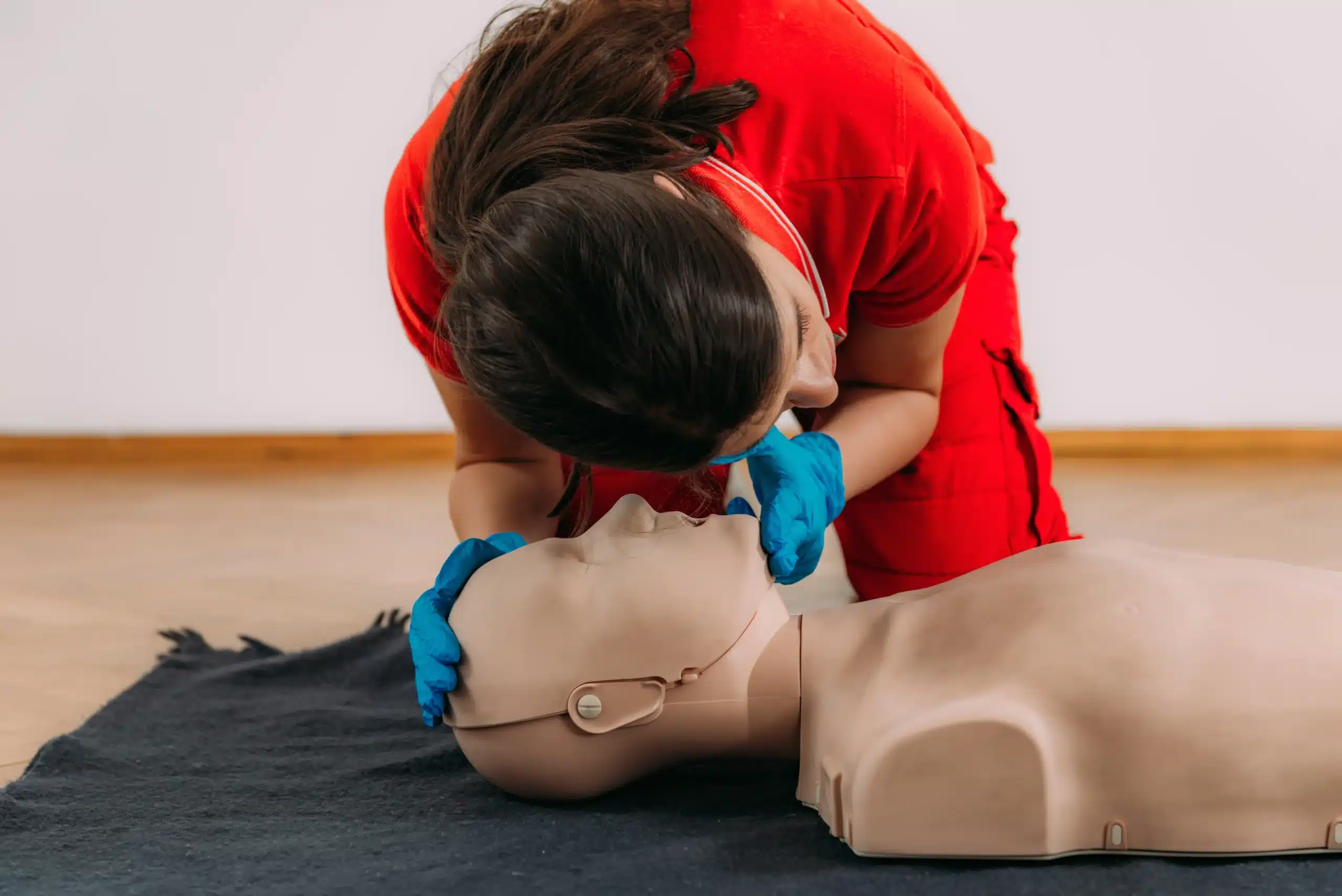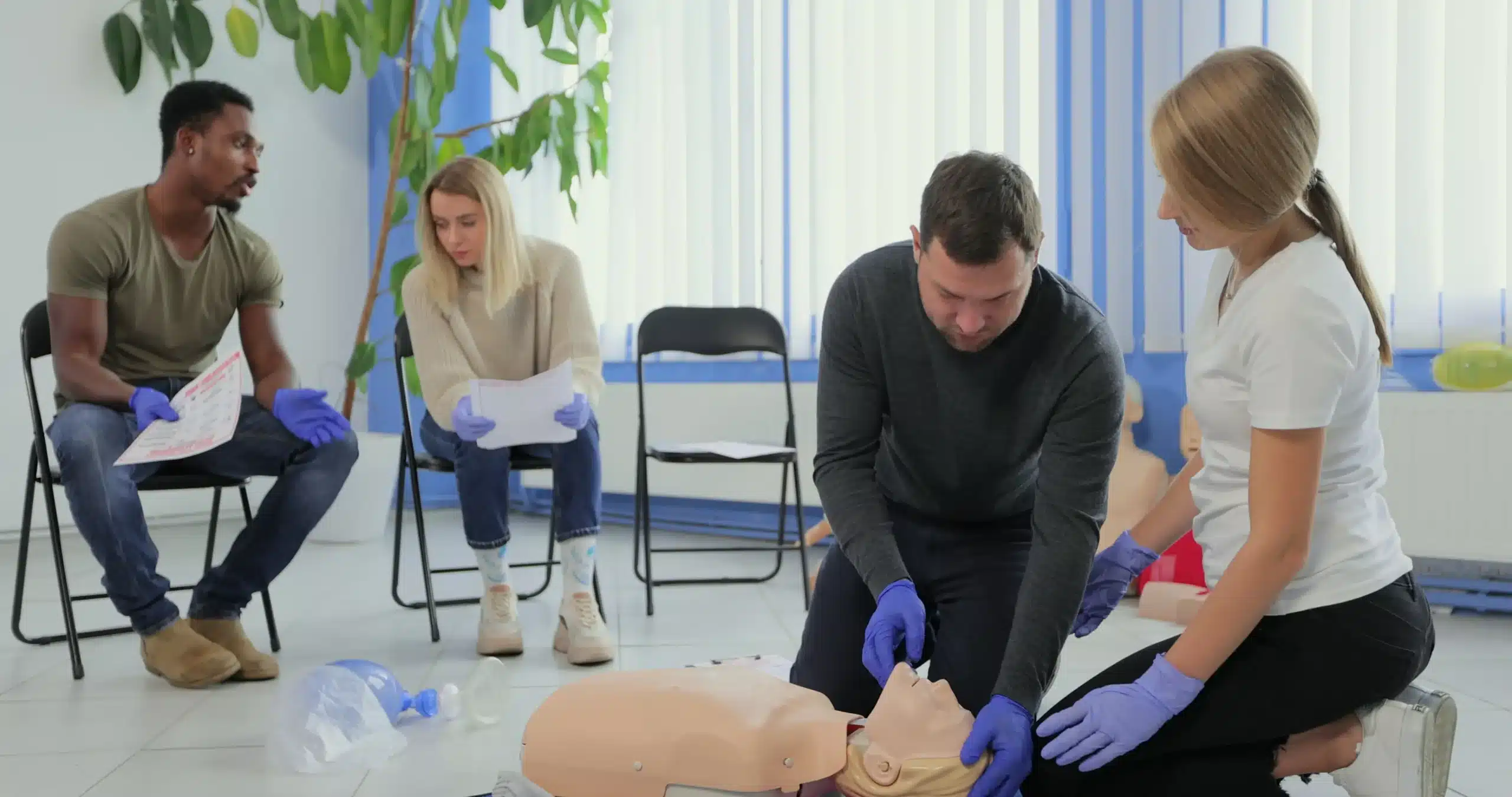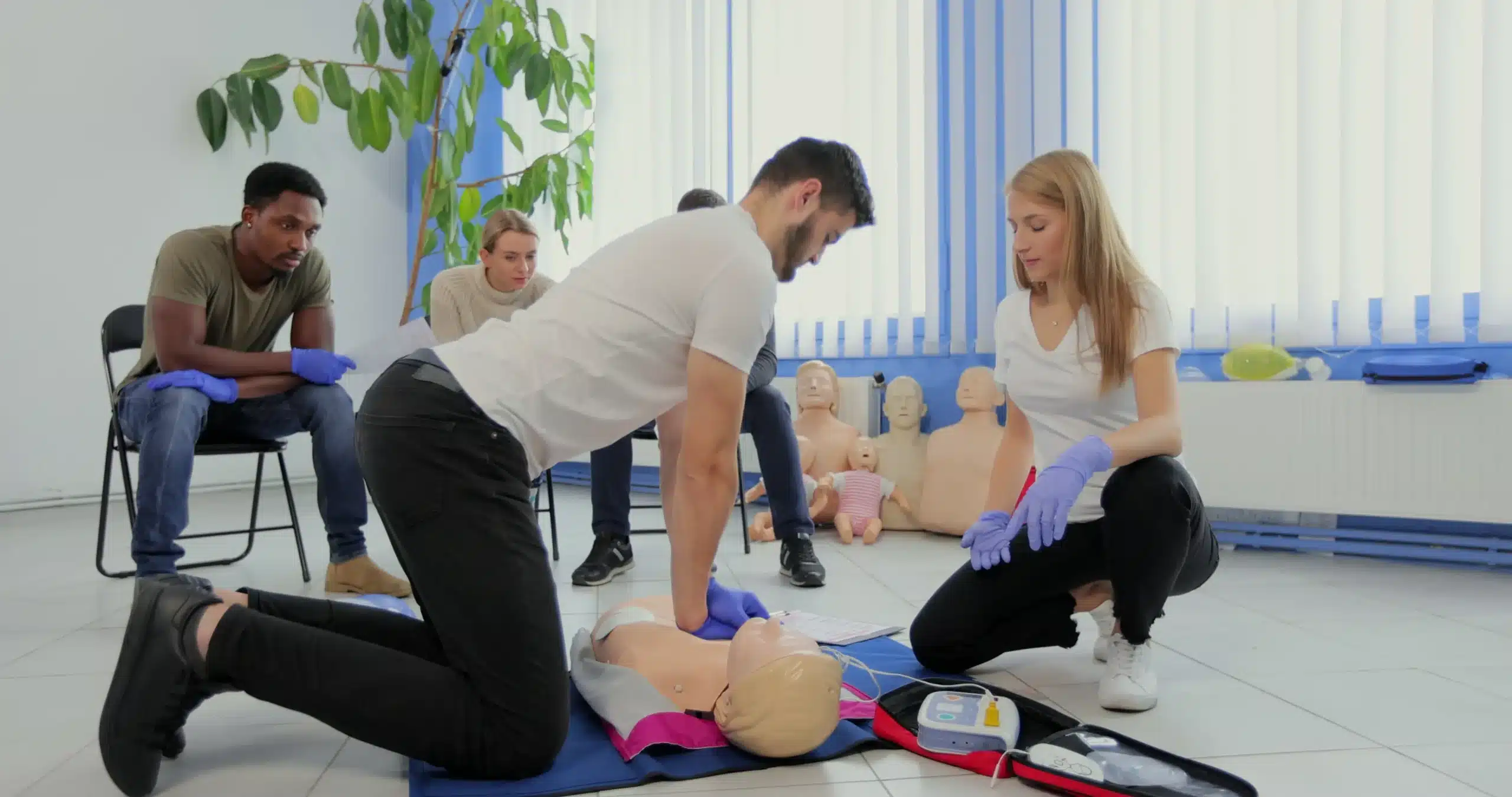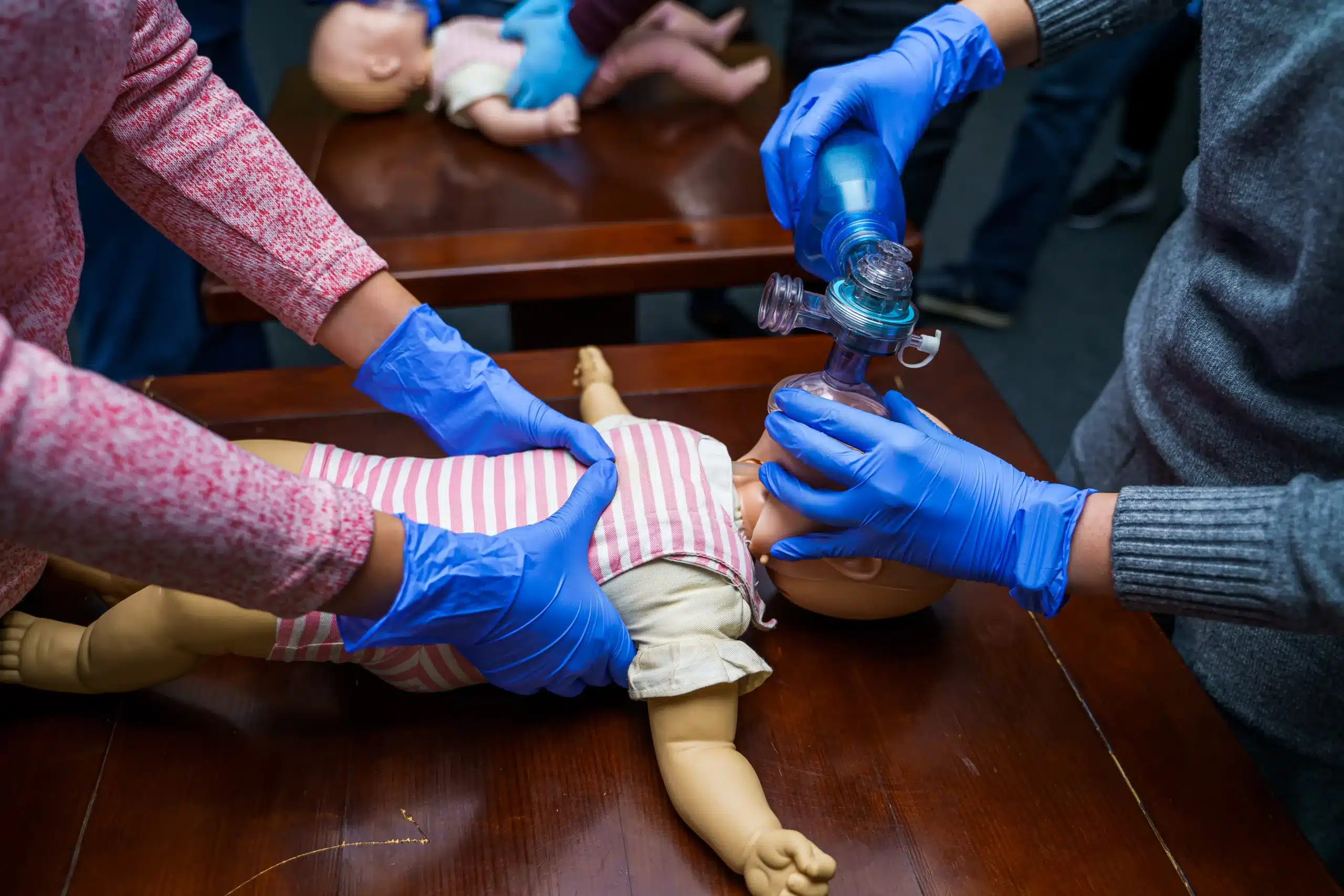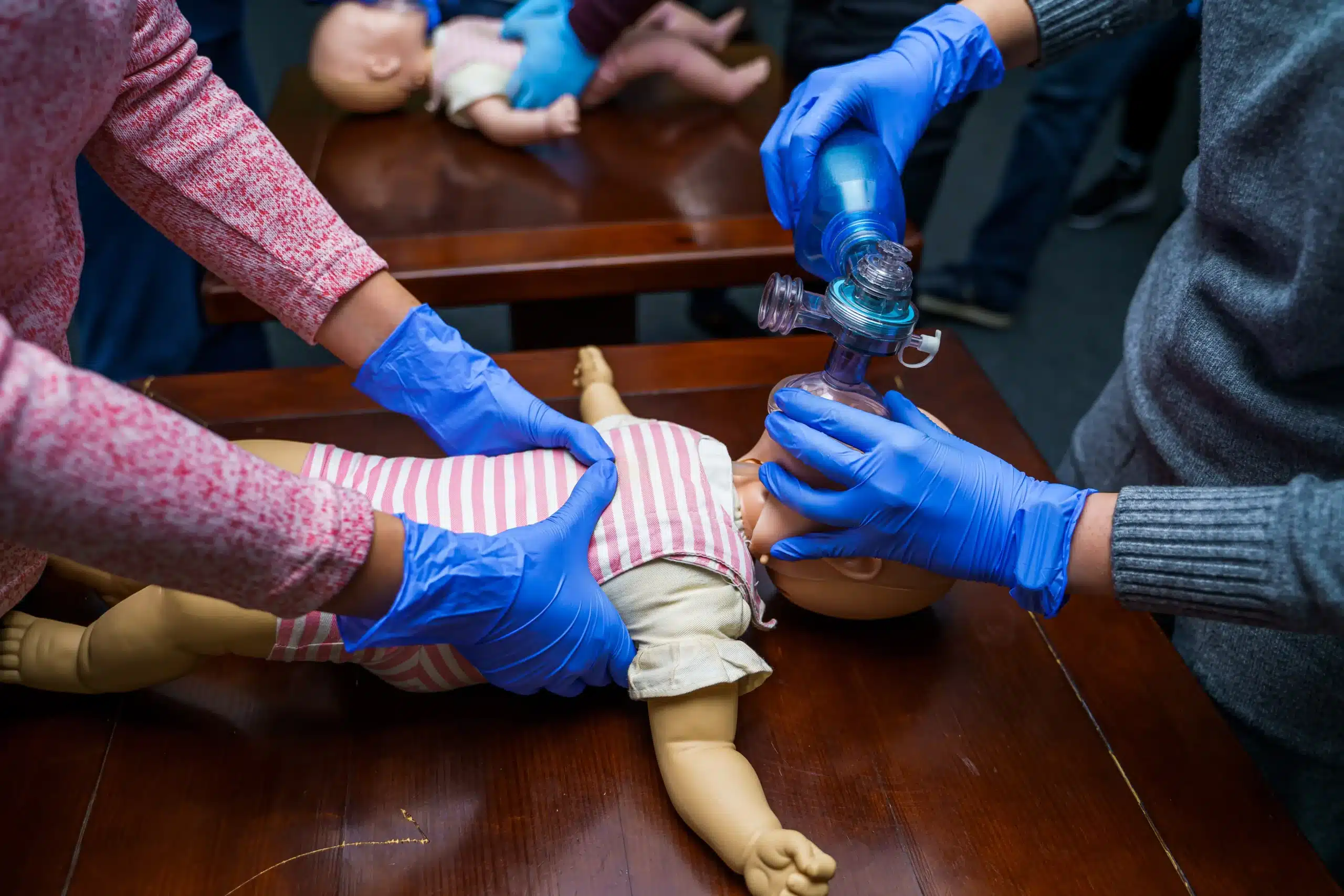As a healthcare professional, your CPR skills are essential. But between long shifts and demanding schedules, finding time for traditional BLS training can be tough. If you’ve been searching for “RQI BLS classes near me,” you’re in the right place. RQI BLS offers a modern, flexible approach to CPR training, allowing you to maintain your skills and confidence without sacrificing valuable time. This article will break down everything you need to know about RQI BLS, from its core features and benefits to finding the perfect class near you in Merced, Turlock, or Atwater. We’ll also cover costs, different learning formats, and how RQI BLS compares to traditional methods. Get ready to discover a more efficient and effective way to stay at the top of your game.
Key Takeaways
- RQI BLS offers a flexible and modern approach to CPR training: It uses short, frequent practice sessions to help you build and maintain crucial CPR skills, fitting easily into busy schedules.
- Finding the right RQI BLS course is essential: Consider factors like cost, location, and your preferred learning style (online, in-person, or blended) when selecting a provider. Ask providers about their training methods and instructor qualifications to ensure a good fit.
- Maintaining your RQI BLS certification requires ongoing practice: Regular, short training sessions are key to keeping your skills sharp and your certification current. This ongoing practice helps you confidently provide high-quality CPR.
What is RQI BLS?
RQI BLS stands for Resuscitation Quality Improvement Basic Life Support. It’s a modern approach to CPR training created for healthcare providers. Developed by RQI Partners, a collaboration between the American Heart Association (AHA) and Laerdal Medical, RQI BLS uses technology and evidence-based methods to improve CPR skills and patient outcomes. It’s built on the latest AHA guidelines, so your training always aligns with current best practices.
Key RQI BLS Features
RQI BLS offers flexible, self-directed learning. Healthcare professionals complete training at their own pace and on their own schedule. The program uses simulation stations to reinforce skills and provide feedback, ensuring competency. This blended learning style, combining online modules with hands-on practice, is part of the AHA’s HeartCode® Complete curriculum. The program emphasizes high-quality CPR, focusing on correct compression rate and depth—critical factors in successful resuscitation.
RQI BLS vs. Traditional BLS
Traditional BLS training typically involves a long, single-session class with infrequent recertification. This can lead to skill decay and decreased confidence. RQI BLS uses “low-dose, high-frequency” training. Short, regular practice sessions on simulation stations maintain skills and build confidence, helping healthcare professionals retain knowledge and perform CPR effectively in emergencies. The best choice depends on your learning style and schedule. Whether you choose RQI BLS or traditional BLS, the goal is to equip you with the skills to provide excellent patient care.
Find RQI BLS Classes Near You
So, you’re ready to get your RQI BLS certification? Great! This section will help you find the right training program, whether you prefer online learning, in-person classes, or a blend of both.
Find Classes Online
The American Red Cross offers a blended learning program that lets you complete some coursework online at your own pace, followed by a hands-on skills session with an instructor. This flexible approach is perfect for busy schedules. Keep in mind that while the Red Cross offers excellent training, they don’t specifically offer RQI BLS certification. It’s always a good idea to confirm certification types with any training provider.
Local RQI BLS Providers
RQI Partners, formed through a partnership between the American Heart Association and Laerdal Medical, focuses on improving resuscitation quality and offers modernized CPR training programs for healthcare organizations. They adhere to the latest AHA guidelines, ensuring your training is current and comprehensive. You can locate certified training centers through their website.
Merced CPR Classes: Your Local Option
For those in the Merced, Turlock, or Atwater area, Merced CPR Classes offers a convenient and affordable option for CPR and BLS training. They work with local EMTs to provide high-quality instruction and often provide on-site training for businesses wanting to certify their teams. This is a great way to prepare your workplace for emergencies. Check out their website to learn more about their courses and low price guarantee. While their site doesn’t specifically mention RQI, contacting them directly can clarify whether they offer RQI BLS certification or other comparable options.
RQI BLS Class Costs and Formats
RQI BLS classes offer various pricing structures and formats to suit different learning styles and budgets. Understanding these options can help you find the best fit for your needs.
Pricing and Discounts
One of the goals of RQI BLS training is to make CPR education more accessible. Many providers offer discounts for group registrations, students, or organizations. Be sure to ask your chosen provider about potential cost savings. Some organizations even offer free or low-cost training programs to remove financial barriers, making CPR training available to everyone. Check with local community centers or healthcare organizations for these opportunities. At Merced CPR Classes, we offer a low price guarantee and group discounts to make training as affordable as possible.
Online, In-Person, and Hybrid Classes
RQI BLS training often uses a blended learning approach, combining online learning with in-person skills practice. This hybrid format typically starts with online modules covering the cognitive aspects of BLS. You’ll then complete a hands-on skills check using an RQI simulation station. This blended learning approach offers flexibility and allows you to learn at your own pace. Fully in-person classes are also available, providing a more traditional learning experience with direct instructor interaction throughout the course. RQI BLS training is convenient and effective.
Flexible Learning Options
RQI BLS training recognizes the need for flexible learning options. The online portion of the blended learning format allows you to study anytime, anywhere, fitting CPR training into your busy schedule. Simplified training models, like those focusing on hands-only CPR, make training more accessible and require minimal equipment. These flexible options make it easier than ever to learn and maintain these essential lifesaving skills. Check with your local providers, like Merced CPR Classes, to see what formats they offer. We understand that our students have busy lives, so we strive to provide options that work for everyone. Review our course prep page to learn more.
Benefits of RQI BLS for Healthcare Professionals
Improve CPR Skills and Confidence
RQI BLS training elevates CPR skills through low-dose, high-frequency practice and personalized feedback. Studies show significant improvements in CPR quality after healthcare professionals complete RQI training. For example, one study found that after just one RQI training session, overall compression scores increased by 81%, and ventilation scores using a bag-mask device jumped from 19% to 70%. This hands-on, simulation-based approach, with its emphasis on correct compression rate and depth, builds skills and fosters confidence for real-life emergencies. RQI’s focus on high-quality CPR equips healthcare providers with the proficiency they need to deliver effective, life-saving care. This regular practice and feedback create a strong foundation for confident and competent CPR performance.
Improve Patient Outcomes
High-quality CPR is directly linked to improved patient outcomes and survival rates during cardiac arrest. RQI programs have demonstrated a 30% improvement in CPR quality over two years, directly impacting patient survival. The continuous feedback mechanism within RQI training helps healthcare professionals refine their techniques and adapt to various emergency scenarios. This focus on feedback is critical for better patient outcomes in cardiac arrest cases. By prioritizing high-quality CPR skills, RQI contributes significantly to increasing the chances of survival for those experiencing cardiac emergencies.
Advance Your Career
RQI BLS certification is a valuable asset for healthcare professionals seeking career advancement. The flexibility of RQI BLS training, with various course formats and schedules, allows you to fit training into your busy schedule. Whether you’re a nurse, doctor, or other healthcare provider, RQI certification demonstrates your commitment to maintaining the highest standards of patient care. RQI programs lead to improved CPR quality and increased learner confidence, positioning you as a skilled and knowledgeable professional. This enhanced skill set and confidence can open doors to new opportunities and career growth within the healthcare field.
What to Expect in an RQI BLS Class
RQI BLS classes offer a fresh approach to CPR training. Here’s what you can expect:
Course Structure and Duration
Unlike traditional BLS courses, which typically involve a single, long class, RQI BLS uses short, frequent training sessions. This “low-dose, high-frequency training” helps you build and maintain crucial skills over time. Think of it like hitting the gym—shorter, more consistent practice creates better long-term results. This distributed practice model contrasts with traditional infrequent training that can lead to skill decay.
Materials and Equipment
RQI BLS classes use high-tech mannequins and training software to give you real-time feedback. This technology helps you refine your technique and ensures you’re providing effective compressions and ventilations. Studies show this type of technology-based CPR training is as effective as traditional methods, and many find it more engaging. You’ll also get hands-on practice with the equipment and personalized guidance from your instructor.
Assessment and Certification
RQI BLS uses competency-based assessments. This means you’ll demonstrate your CPR skills to earn your certification. The frequent practice sessions help you build confidence and improve quickly. Research shows significant improvement in CPR skills after just one RQI training session. You’ll receive regular feedback and support from your instructor throughout the course.
Prepare for Your RQI BLS Class
Getting ready for your RQI BLS class? A little prep work goes a long way. Here’s how to set yourself up for success:
Pre-Course Study
Brushing up on CPR fundamentals before class can make a real difference. A strong foundation helps you absorb new information more easily and build your skills faster. Take some time to review basic CPR principles and guidelines. Understanding the feedback mechanisms that enhance CPR performance is crucial for improving training effectiveness and, ultimately, patient outcomes.
Tech Requirements for Online Learning
If you’re taking an online or blended learning course, make sure you have the right tech in place. This might include a reliable internet connection, a webcam, and a microphone. Testing your setup beforehand can prevent technical glitches during class. Instructor-guided, technology-based CPR training that includes hands-on practice and real-time feedback is as effective as standard CPR training.
Tips for RQI BLS Success
Choosing the right BLS certification course is key. Consider your learning style, schedule, and career goals when making your decision. Think about whether an online, in-person, or blended learning format works best for you. Also, check if your employer requires a specific type of BLS certification.
Maintain Your RQI BLS Certification
RQI BLS certification focuses on frequent practice to maintain crucial skills. This differs from traditional BLS certification, which typically involves a longer, less frequent renewal process. Let’s explore how you keep your RQI BLS certification current.
Renewal Requirements
RQI BLS certification emphasizes a competency-based approach. Instead of one lengthy recertification class every two years like traditional BLS, RQI uses low-dose, high-frequency training. This means you’ll engage in shorter, more regular practice sessions to reinforce your skills. These sessions are designed to fit easily into your schedule, building your knowledge and muscle memory. This approach ensures you’re always ready to respond effectively in a real-world emergency. You’ll find that maintaining your certification becomes a seamless part of your routine.
Ongoing Skill Maintenance
The beauty of RQI is its focus on continuous improvement. Short, frequent training sessions are key for skill retention. Studies show that this method significantly improves both compression and ventilation skills, leading to better patient outcomes. RQI training also incorporates feedback mechanisms, allowing you to understand your performance and identify areas for growth. This ongoing practice and feedback loop helps build confidence and ensures you’re always prepared to provide high-quality CPR.
Choose the Right RQI BLS Provider
So, you’re ready to sign up for RQI BLS training? Great! Choosing the right provider is an important step. This section will help you find a program that fits your needs.
Factors to Consider
When selecting an RQI BLS provider, consider the quality and comprehensiveness of the training. RQI training is part of HeartCode® Complete, a blended-learning curriculum from the American Heart Association (AHA) that combines online learning and hands-on skills checks. This blended approach ensures you’ll get a solid foundation in both theory and practice. Also, think about the provider’s reputation and experience in delivering RQI BLS training.
Questions to Ask
Before committing to a provider, ask about their training methods and how they provide feedback. Understanding how feedback works is crucial for improving CPR performance and, ultimately, patient outcomes. A good provider will have a system in place to help you learn and improve your skills. Don’t hesitate to ask about the instructors’ qualifications and the overall learning environment. You want to make sure you’re learning from experienced professionals in a supportive setting. Inquire about class sizes too—smaller classes often allow for more personalized attention.
RQI BLS Providers
Several organizations offer RQI BLS training. Here are a few well-known providers:
American Heart Association
The AHA is a leading authority in CPR training, and their RQI Program is unique because it’s the only solution for maintaining competency that integrates AHA BLS and ACLS materials and course completion cards. This means your training stays current and aligned with the latest guidelines.
Laerdal Medical
Laerdal Medical is a key partner in the RQI initiative. RQI Partners, a collaboration between the AHA and Laerdal Medical, offers modernized CPR training programs for healthcare organizations using the latest AHA guidelines. This partnership ensures high-quality, up-to-date training.
HealthStream
HealthStream focuses on making CPR training accessible and effective. Their approach aims to simplify training and make it more affordable, which can be especially helpful for organizations needing to train many employees. This focus on accessibility helps more people gain these life-saving skills. You can learn more about their programs on the HealthStream website.
WorldPoint
WorldPoint emphasizes clear communication and accessible materials in their training. This focus on clarity can make learning easier and more effective, helping participants truly understand the material. Clear communication is essential for effective training in any field. For more information, visit the WorldPoint website.
Common RQI BLS Concerns
It’s natural to have questions about a new training program. Let’s address some common concerns about RQI BLS.
Cost Comparison with Traditional BLS
One common question about RQI BLS training is the cost. Many providers offer free or low-cost programs to make CPR education accessible and build safer communities. For example, Merced CPR Classes offers a low price guarantee. Remember, CPR training is an investment in your community’s well-being.
Time Commitment and Flexibility
RQI BLS training is more flexible than traditional BLS courses. Instead of one lengthy session, RQI uses a “low-dose, high-frequency” model. This involves shorter, more frequent training sessions that fit busy schedules. You’ll build mastery through regular practice with this competency-based approach.
Blended Learning Effectiveness
You might also wonder about the effectiveness of blended learning, which combines online and hands-on components. Studies show that this approach, with real-time feedback, is as effective as traditional CPR training. Blended learning provides an engaging experience, and technology can improve understanding and skill retention. This article explores feedback mechanisms in CPR training, and this research discusses technology in CPR education.
Related Articles
- RQI Classes in Merced, CA – Merced CPR Classes
- Find BLS Training Near Me: A Practical Guide – Merced CPR Classes
- Why CPR is a Lifesaving Skill in Healthcare
- HeartCode BLS Atwater: Your Guide to Online CPR Training – Merced CPR Classes
- Find CPR Courses Near Me: Your Guide – Merced CPR Classes
Frequently Asked Questions
What exactly is RQI BLS and how does it differ from traditional BLS? RQI BLS is a more modern, technology-driven approach to CPR training than traditional BLS. It emphasizes short, frequent practice sessions using simulation stations and personalized feedback, leading to better skill retention and confidence. Traditional BLS usually involves a longer, single-session class with less frequent renewals. Both methods teach the same core life-saving skills, but RQI BLS offers a more flexible and engaging learning experience.
Where can I find RQI BLS classes near me? You can find RQI BLS classes through several avenues. The RQI Partners website has a search tool to locate certified training centers in your area. The American Red Cross offers blended learning BLS courses, though it’s important to confirm if they offer RQI-specific certification. Additionally, local providers like Merced CPR Classes often offer various CPR and BLS training options, and they may be able to provide RQI certification or a comparable alternative. Contacting them directly is the best way to find out what they offer.
How much does RQI BLS training cost, and are there different learning formats available? The cost of RQI BLS training varies depending on the provider and format. Many providers offer discounts for groups, students, or organizations. Some even offer free or low-cost community training programs. RQI BLS classes are available in online, in-person, and blended learning formats to accommodate different learning styles and schedules. Blended learning combines online modules with in-person skills practice, offering flexibility and convenience.
What are the key advantages of RQI BLS for healthcare professionals? RQI BLS offers several benefits for healthcare providers. The frequent practice and feedback improve CPR skills and boost confidence. Studies show a direct link between high-quality CPR and improved patient outcomes, meaning RQI-trained professionals are better equipped to handle real-life emergencies. RQI BLS certification also demonstrates a commitment to maintaining high standards of care, which can be a valuable asset for career advancement.
How can I prepare for an RQI BLS class and what should I expect during training? Preparing for an RQI BLS class is straightforward. Reviewing basic CPR principles beforehand can be helpful. If your course includes online modules, ensure you have a reliable internet connection and any necessary equipment like a webcam and microphone. During the class, expect short, focused training sessions with hands-on practice using simulation stations and real-time feedback. You’ll be assessed on your competency in performing CPR skills to earn your certification.
